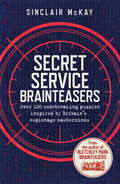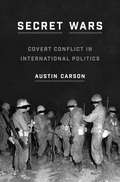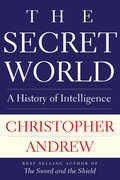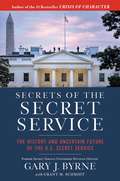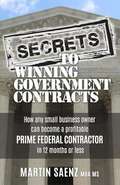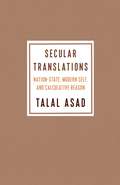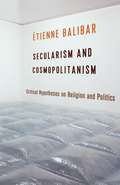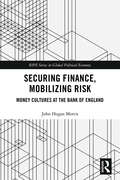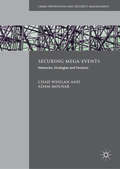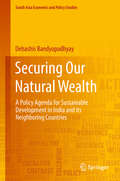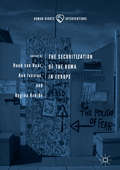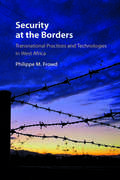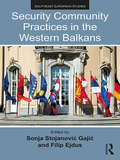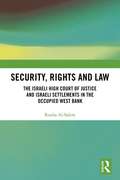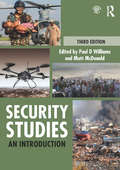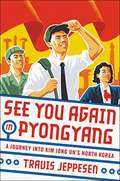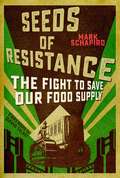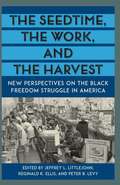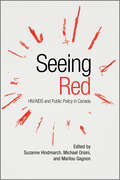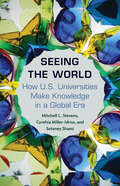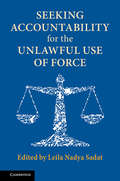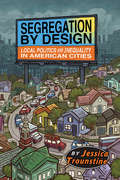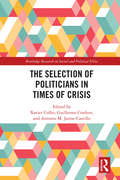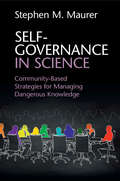- Table View
- List View
Secret Service Brainteasers: Do you have what it takes to be a spy?
by Sinclair McKaySinclair McKay's Bletchley Park Brainteasers was the runaway quiz book bestseller of 2017, now it's time to pit your wits against the secret heroes of MI5 and MI6 and find out if YOU have what it takes to be a spy!If you cracked the GCHQ Puzzle Book and followed the Ordnance Survey Puzzle Book, you MUST show off your James Bond credentials with Secret Service Brainteasers ...Whether you have linguistic flair, an instinct for technology or good old common sense, pit your wits against some of the greatest minds of our time with ingenious brainteasers including secret languages, sabotage themed brain bogglers, deadly countdowns and hidden codes.Weaving astonishing stories of the men and women who operate from the shadows, the secret heroes and heroines of MI5 and MI6 who have faced extraordinary and terrifying challenges and a wide range of mind twisting puzzles, Secret Service Brainteasers will test your mental agility to discover: Do YOU have what it takes to be a spy?
Secret Wars: Covert Conflict in International Politics (Princeton Studies in International History and Politics #157)
by Austin CarsonSecret Wars is the first book to systematically analyze the ways powerful states covertly participate in foreign wars, showing a recurring pattern of such behavior stretching from World War I to U.S.-occupied Iraq. Investigating what governments keep secret during wars and why, Austin Carson argues that leaders maintain the secrecy of state involvement as a response to the persistent concern of limiting war. Keeping interventions “backstage” helps control escalation dynamics, insulating leaders from domestic pressures while communicating their interest in keeping a war contained.Carson shows that covert interventions can help control escalation, but they are almost always detected by other major powers. However, the shared value of limiting war can lead adversaries to keep secret the interventions they detect, as when American leaders concealed clashes with Soviet pilots during the Korean War. Escalation concerns can also cause leaders to ignore covert interventions that have become an open secret. From Nazi Germany’s role in the Spanish Civil War to American covert operations during the Vietnam War, Carson presents new insights about some of the most influential conflicts of the twentieth century.Parting the curtain on the secret side of modern war, Secret Wars provides important lessons about how rival state powers collude and compete, and the ways in which they avoid outright military confrontations.
The Secret World: A History of Intelligence (The Henry L. Stimson Lectures Series)
by Christopher Andrew“A comprehensive exploration of spying in its myriad forms from the Bible to the present day . . . Easy to dip into, and surprisingly funny.” —Ben Macintyre in The New York Times Book ReviewThe history of espionage is far older than any of today’s intelligence agencies, yet largely forgotten. The codebreakers at Bletchley Park, the most successful WWII intelligence agency, were completely unaware that their predecessors had broken the codes of Napoleon during the Napoleonic wars and those of Spain before the Spanish Armada.Those who do not understand past mistakes are likely to repeat them. Intelligence is a prime example. At the outbreak of WWI, the grasp of intelligence shown by US President Woodrow Wilson and British Prime Minister Herbert Asquith was not in the same class as that of George Washington during the Revolutionary War and eighteenth-century British statesmen. In the first global history of espionage ever written, distinguished historian and New York Times–bestselling author Christopher Andrew recovers much of the lost intelligence history of the past three millennia—and shows us its continuing relevance.“Accurate, comprehensive, digestible and startling . . . a stellar achievement.” —Edward Lucas, The Times“For anyone with a taste for wide-ranging and shrewdly gossipy history—or, for that matter, for anyone with a taste for spy stories—Andrew’s is one of the most entertaining books of the past few years.” —Adam Gopnik, The New Yorker“Remarkable for its scope and delightful for its unpredictable comparisons . . . there are important lessons for spymasters everywhere in this breathtaking and brilliant book.” —Richard J. Aldrich, Times Literary Supplement“Fans of Fleming and Furst will delight in this skillfully related true-fact side of the story.” —Kirkus Reviews“A crowning triumph of one of the most adventurous scholars of the security world.” —Financial TimesIncludes illustrations
Secrets of the Secret Service: The History and Uncertain Future of the U.S. Secret Service (Pocket Inspirations)
by Gary J. Byrne Grant M. SchmidtFrom the author of the #1 New York Times bestseller CRISIS OF CHARACTER comes an explosive new exposé of the Secret Service.The United States Secret Service is tasked with protecting our Presidents, their families, and the complex in which they live and work. Given this important mission, world stability rests upon the shoulders of its agents. In his new book, former Secret Service officer Gary Byrne takes readers behind the scenes to understand the agency's history and today's security failings that he believes put Americans at risk The American public knows the stories of Secret Service heroism, but they don't know about the hidden legacy of problems that have plagued the agency ever since its creation.Gary Byrne says that decades of catastrophic public failures, near misses, and bureaucratic and cultural rot threaten to erode this critical organization from the inside out.Today, as it works to protect President Trump, the Secret Service stands at a crossroads, and the time needed to choose the right course is running out. Agents and officers are leaving the Secret Service in droves, or they're being overworked to the point where they lose focus on the job. Management makes decisions based on politics, not the welfare of their employees. Byrne believes that this means danger for the men and women of the Secret Service, danger for the President they protect, and danger for the nation. In this book, he shares what he has witnessed and learned about the Secret Service with the hope that the problems of this most important agency can be fixed before it's too late.
Secrets to Winning Government Contracts: How any small business owner can become a profitable Prime Federal Contractor in 12 months or less
by Martin SaenzHOW TO BECOME A PROFITABLE PRIME FEDERAL CONTRACTOR. Martin Saenz and his wife Ruth started their exhibit display design and fabrication business in their basement and, over the course of 14 years and scores of successfully-completed prime federal contracts, have built it into a multi-million dollar enterprise operating out of its own large warehouse and production facility. In this book Martin shares all the fundamental success factors he has learned.
Secular Translations: Nation-State, Modern Self, and Calculative Reason (Ruth Benedict Book Series)
by Talal AsadIn Secular Translations, the anthropologist Talal Asad reflects on his lifelong engagement with secularism and its contradictions. He draws out the ambiguities in our concepts of the religious and the secular through a rich consideration of translatability and untranslatability, exploring the circuitous movements of ideas between histories and cultures.In search of meeting points between the language of Islam and the language of secular reason, Asad gives particular importance to the translations of religious ideas into nonreligious ones. He discusses the claim that liberal conceptions of equality represent earlier Christian ideas translated into secularism; explores the ways that the language and practice of religious ritual play an important but radically transformed role as they are translated into modern life; and considers the history of the idea of the self and its centrality to the project of the secular state. Secularism is not only an abstract principle that modern liberal democratic states espouse, he argues, but also a range of sensibilities. The shifting vocabularies associated with each of these sensibilities are fundamentally intertwined with different ways of life. In exploring these entanglements, Asad shows how translation opens the door for—or requires—the utter transformation of the translated. Drawing on a diverse set of thinkers ranging from al-Ghazālī to Walter Benjamin, Secular Translations points toward new possibilities for intercultural communication, seeking a language for our time beyond the language of the state.
Secularism and Cosmopolitanism: Critical Hypotheses on Religion and Politics (European Perspectives: A Series in Social Thought and Cultural Criticism)
by Étienne BalibarWhat is the relationship between cosmopolitanism and secularism—the worldwide and the worldly? While cosmopolitan politics may seem inherently secular, existing forms of secularism risk undermining the universality of cosmopolitanism because they privilege the European tradition over all others and transform particular historical norms into enunciations of truth, valid for all cultures and all epochs. In this book, the noted philosopher Étienne Balibar explores the tensions lurking at this troubled nexus in order to advance a truly democratic and emancipatory cosmopolitanism, which requires a secularization of secularism itself.Balibar argues for the idea of the universal against its particular dominant institutions. He questions the assumptions that underlie popular ideas of secularism and religion and outlines the importance of a new critique for the contemporary world. Balibar holds that conflicts between religious and secular discourses need to be reframed from a point of view that takes into account the cultural hybridization, migration and mobility, and transformation of borders that have reshaped the postcolonial age. Among the topics discussed are the uses and misuses of the category of religion and the religious, the paradoxical genealogy of monotheism, French laïcité’s identitarian turn, and the implications of the responses to the Charlie Hebdo attacks for an extended definition of free speech. Going beyond circumscribed notions of religion and the public sphere, Secularism and Cosmopolitanism is a profound rethinking of identity and difference that seeks to make room for a renewed political imagination.
Securing Finance, Mobilizing Risk: Money Cultures at the Bank of England (RIPE Series in Global Political Economy)
by John MorrisDrawing on the history of modern finance, as well as the sociology of money and risk, this book examines how cultural understandings of finance have contributed to the increased capitalization of the UK financial system following the Global Financial Crisis. Providing both a geographically-inflected analysis and re-appraisal of the concept of performativity, it demonstrates that financial risk management has a spatiality that helps to inform understandings and imaginaries of the risks associated with money and finance. The book traces the development of understandings of risk at the Bank of England, with an analysis that spans some 1,000 reports, documents and speeches alongside elite interviews with past and present employees at the central bank. The author argues that the Bank has moved from a relatively broad-brush approach to the risks being managed in the financial sector, to a greater preoccupation with the understanding and mapping of the mobilization of financial risk. The study of financial practices from a critical social sciences and humanities perspective has grown rapidly since the Global Financial Crisis and this book will be of interest to multiple subject areas including IPE, economic geography, sociology of finance and critical security studies.
Securing Mega-Events: Networks, Strategies and Tensions (Crime Prevention and Security Management)
by Chad Whelan Adam MolnarMega-events such as the Olympic Games, World Cup finals and international political summits are occasions of almost unparalleled economic, political and social significance for host nations and cities. The scale and scope of mega-event security has continued to grow enormously since 11 September 2001, consistently involving the largest policing and security operations for event hosts outside of wartime. This book is the first to focus exclusively on the organisational dynamics underpinning the design and delivery of mega-event security. Using the G20 Summit in Brisbane, Australia in November 2014 as a case study, in conjunction with comparisons with events such as the Toronto 2010 G20, the authors engage in a comprehensive assessment of the networks, strategies and tensions involved in mega-event security. By drawing on the insightful experiences of those responsible for securing the Brisbane 2014 G20, the authors look behind-the-scenes to capture the complexity of mega-event security. The authors argue that such an approach is essential to better appreciate how different conceptions of security, ways of thinking and acting, impact a range of security ideals and outcomes.
Securing Our Natural Wealth: A Policy Agenda for Sustainable Development in India and for Its Neighboring Countries (South Asia Economic and Policy Studies)
by Debashis BandyopadhyayThis book explores various aspects of Intellectual Property Rights (IPR) regimes with regard to plant-variety protection and farmers’ rights; traditional knowledge; geographical indications, genetically modified crops; and access to genetic resources within the broad ambit of Trade-Related Aspects of Intellectual Property Rights (TRIPS), the Convention of Biological Diversity and other treaties/protocols. Enumerating the governance provisions for India and some of its neighboring countries, including Nepal, Sri Lanka, Bangladesh, Bhutan, Thailand and Myanmar, the book synthesizes a policy agenda to drive sustainable development. Further, it assesses and interprets the status quo, and discusses key issues and implications. By comparing various governance frameworks in South Asian countries, it attempts to bridge policy issues concerning development, IPR and international studies.
The Securitization of the Roma in Europe (Human Rights Interventions Ser.)
by Huub Van Baar Ana Ivasiuc Regina KreideThis book discusses how Europe’s Roma minorities have often been perceived as a threat to majority cultures and societies. Frequently, the Roma have become the target of nationalism, extremism, and racism. At the same time, they have been approached in terms of human rights and become the focus of programs dedicated to inclusion, anti-discrimination, and combatting poverty. This book reflects on this situation from the viewpoint of how the Roma are often ‘securitized,’ understood and perceived as ‘security problems.’ The authors discuss practices of securitization and the ways in which they have been challenged, and they offer an original contribution to debates about security and human rights interventions at a time in which multiple crises both in and of Europe are going hand-in-hand with intensified xenophobia and security rhetoric.
Security at the Borders: Transnational Practices and Technologies in West Africa
by Philippe M. FrowdBorders are not just lines in the sand, but increasingly globalised spaces of practice. This is the case in West Africa, where a growing range of local and international officials are brought together by ambitious security projects around common anxieties. These projects include efforts to stop irregular migration by sea through international police cooperation, reinforcing infrastructures at border posts, and the application of new digital identification tools to identify and track increasingly mobile citizens. These interventions are driven by global and local security agendas, by biometric passport rules as much as competition between local security agencies. This book draws on the author's multi-sited ethnography in Mauritania and Senegal, showing how border security practices and technologies operate to build state security capacity, transform how state agencies work, and produce new forms of authority and expertise.
Security Community Practices in the Western Balkans (Southeast European Studies)
by Sonja Stojanović Gajić Filip EjdusIn the early 1990s, the Western Balkans were the scene of prolonged and bloody inter-ethnic wars. Numerous issues remain unresolved; Bosnia is a dysfunctional state; Kosovo a disputed territory; Macedonia a fragile republic, however, it is hard now to imagine the renewal of inter-state armed conflict. Investigating the causes and mechanisms driving peaceful transformation in the Balkans, this book examines developments in the region and contributes to discussions on security community building. Focusing on how different professional communities work together in the creation of regional peace and security, it sheds new light on how diplomats, policemen, soldiers and others brought about the transformation from conflict to peace through their everyday practices. Conducted collaboratively by a research community based within the region, this volume will be highly relevant to scholars and researchers studying the Balkans, regional security, security communities and policymakers.
Security, Rights and Law: The Israeli High Court of Justice and Israeli Settlements in the Occupied West Bank (Comparative Constitutionalism in Muslim Majority States)
by Rouba Al-SalemThis book examines how the Israeli High Court of Justice (HCJ) has interpreted and applied international law principles in adjudicating petitions filed by Palestinians. The research focuses on HCJ judgments that have been rendered since the outbreak of the Second Intifada (2000) in relation to petitions challenging the legality of measures implemented by various Israeli governments and military authorities for the professed need of enhancing the security of Israeli settlements and settlers in the occupied West Bank. It discusses to what extent the HCJ provides a venue for an effective domestic remedy for alleged violations of the Palestinians’ internationally protected rights. It further analyses the judgments of the Court seeking to demonstrate why it appears to show a preference for invoking principles of Israeli administrative and constitutional law, thereby promoting the domestic rather than international Rule of Law. Although the jurisprudence of the HCJ has often been hailed as that of an ‘activist’ court, the analysis of petitions adjudicated by the Court between 2000 and 2014 illustrates why its approach is ill-suited to a situation of prolonged military occupation. Finally, the book evaluates what impact the Court’s adjudication, reasoning and interpretation has on the normative coherence of the international law of belligerent occupation.
Security Studies: An Introduction (Routledge Critical Security Studies)
by Paul D. Williams Matt McDonaldSecurity Studies: An Introduction, 3rd edition, is the most comprehensive textbook available on the subject, providing students with an essential grounding in the debates, frameworks, and issues on the contemporary security agenda. This new edition has been comprehensively revised and updated, with new chapters added on poststructuralism, postcolonialism, securitization, peace and violence, development, women, peace and security, cybersecurity, and outer space. Divided into four parts, the text provides students with a detailed, accessible overview of the major theoretical approaches, key themes, and most significant issues within security studies. Part 1 explores the main theoretical approaches from both traditional and critical standpoints Part 2 explains the central concepts underpinning contemporary debates Part 3 presents an overview of the institutional security architecture Part 4 examines some of the key contemporary challenges to global security Collecting these related strands into a single textbook creates a valuable teaching tool and a comprehensive, accessible learning resource for undergraduates and MA students.
See You Again in Pyongyang: A Journey into Kim Jong Un's North Korea
by Travis JeppesenFrom terrifying missile tests to the war of words between President Trump and Kim Jong Un--not to mention stranger-than-fiction stories of purges and assassinations--news from North Korea dominates global headlines. But what is life there actually like?In See You Again in Pyongyang, Travis Jeppesen, the first American to complete a university program in North Korea, culls from his experiences living, traveling, and studying in the country to create a multifaceted portrait of the country and its idiosyncratic capital city in the Kim Jong Un Era. Anchored by the experience of his five trips to North Korea and his interactions with citizens from all walks of life, Jeppesen takes readers behind the propaganda, showing how the North Korean system actually works in daily life. He challenges the notion that Pyongyang is merely a "showcase capital" where everything is staged for the benefit of foreigners, as well as the idea that Pyongyangites are brainwashed robots. Jeppesen introduces readers to an array of fascinating North Koreans, from government ministers with a side hustle in black market Western products to young people enamored with American pop culture. With unique personal insight and a rigorous historical grounding, Jeppesen goes beyond the media cliches, showing North Koreans in their full complexity. See You Again in Pyongyang is an essential addition to the literature about one of the world's most fascinating and mysterious places.
Seeds of Resistance: The Fight to Save Our Food Supply
by David Talbot Mark SchapiroSun. Soil. Water. Seed. These are the primordial ingredients for the most essential activity of all on earth: growing food. All of these elements are being changed dramatically under the pressures of corporate consolidation of the food chain, which has been accelerating just as climate change is profoundly altering the conditions for growing food. In the midst of this global crisis, the fate of our food has slipped into a handful of the world’s largest companies. Food Chained will bring home what this corporate stranglehold is doing to our daily diet, from the explosion of genetically modified foods to the rapid disappearance of plant varieties to the elimination of independent farmers who have long been the bedrock of our food supply.Food Chained will touch many nerves for readers, including concerns about climate change, chronic drought in essential farm states like California, the persistence of the junk food culture, the proliferation of GMOs, and the alarming domination of the seed market and our very life cycle by global giants like Monsanto.But not all is bleak when it comes to the future of our food supply. Food Chained will also present hopeful stories about farmers, consumer groups, and government agencies around the world that are resisting the tightening corporate squeeze on our food chain.
The Seedtime, the Work, and the Harvest: New Perspectives on the Black Freedom Struggle in America (Southern Dissent)
by Jeffrey L. Littlejohn Reginald K. Ellis Peter B. LevyThis volume's contributors expand the chronology and geography of the black freedom struggle beyond the traditional emphasis on the Jim Crow South and the years between 1954 and 1968. Beginning as far back as the nineteenth century, and analyzing case studies from southern, northern, and border states, the essays in The Seedtime, the Work, and the Harvest incorporate communities and topics not usually linked to the African American civil rights movement. The collection opens with a biographical sketch of Thomas DeSaille Tucker, an educational pioneer who served as the first president of Florida State Normal and Industrial School for Colored Students. It then highlights the work of black women, including Bostonian publisher Josephine St. Pierre Ruffin, who defied local governments during the Progressive Era by disseminating medical information and providing access to medical professionals. Next, the collection explores the life and work of Norfolk civil rights attorney James F. Gay, who helped to democratize the political establishment in Virginia’s largest city but became a victim of his own success. The collection then moves to York, Pennsylvania, to examine a 1969 riot that went mostly unnoticed until the town's mayor was charged--more than thirty years later--with the riot-related murder of Lillie Belle Allen. Also featured is an essay examining the Student Nonviolent Coordinating Committee's "Food for Freedom" campaign that aimed to complement voter registration work in Mississippi by providing everyday sustenance to African Americans. Addressing more recent issues, this volume considers the politics of public memory in Baltimore, Maryland, a city divided by racial "riots" in 1968 and in 2015. It then examines the Black Lives Matter movement that gained international attention for its response to Michael Brown's death at the hands of police in Ferguson, Missouri, as well as the Sandra Bland Movement inspired by the arrest of Bland and her subsequent death in the Waller County jail in rural Texas. These chapters connect the activism of today--shaped in so many ways by social media, student activism, and grassroots organization--to a deeply historical, wide-ranging fight for equality.
Seeing Red: HIV/AIDS and Public Policy in Canada
by Suzanne Hindmarch Michael Orsini Marilou GagnonWhat does it mean to think of HIV/AIDS policy in a critical manner? Seeing Red offers the first critical analysis of HIV/AIDS policy in Canada. Featuring the diverse experiences of people living with HIV, this collection highlights various perspectives from academics, activists, and community workers who look ahead to the new and complex challenges associated with HIV/AIDS and Canadian society. In addition to representing a diversity of voices and perspectives, Seeing Red reflects on historical responses to HIV/AIDS in Canada. Among the specific issues addressed are the over-representation of Indigenous peoples among those living with HIV, the criminalization of HIV, and barriers to health and support services, particularly as experienced by vulnerable and marginalized populations. The editors and contributors seek to show that Canada has been neither uniquely compassionate nor proactive when it comes to supporting those living with HIV/AIDS. Instead, this remains a critical area of public policy, one fraught with challenges as well as possibilities.
Seeing the World: How US Universities Make Knowledge in a Global Era
by Mitchell L. Stevens Cynthia Miller-Idriss Seteney ShamiAn in-depth look at why American universities continue to favor U.S.-focused social science research despite efforts to make scholarship more cosmopolitanU.S. research universities have long endeavored to be cosmopolitan places, yet the disciplines of economics, political science, and sociology have remained stubbornly parochial. Despite decades of government and philanthropic investment in international scholarship, the most prestigious academic departments still favor research and expertise on the United States. Why? Seeing the World answers this question by examining university research centers that focus on the Middle East and related regional area studies.Drawing on candid interviews with scores of top scholars and university leaders to understand how international inquiry is perceived and valued inside the academy, Seeing the World explains how intense competition for tenure-line appointments encourages faculty to pursue “American” projects that are most likely to garner professional advancement. At the same time, constrained by tight budgets at home, university leaders eagerly court patrons and clients worldwide but have a hard time getting departmental faculty to join the program. Together these dynamics shape how scholarship about the rest of the world evolves.At once a work-and-occupations study of scholarly disciplines, an essay on the formal organization of knowledge, and an inquiry into the fate of area studies, Seeing the World is a must-read for anyone who cares about the future of knowledge in a global era.
Seeking Accountability for the Unlawful Use of Force
by Leila Nadya SadatDespite the conclusion of the International Military Tribunal at Nuremberg that aggression is the 'supreme international crime', armed conflict remains a frequent and ubiquitous feature of international life, leaving millions of victims in its wake.<P><P> This collection of original chapters by leading and emerging scholars from all around the world evaluates historic and current examples of the use of force and the context of crimes of aggression. As we approach the 75th anniversary of the Nuremberg War Crimes Tribunal, Seeking Accountability for the Unlawful Use of Force examines the many systems and accountability frameworks which have developed since the Second World War. By suggesting new avenues for enhancing accountability structures already in place as well as proposing new frameworks needed, this volume will begin a movement to establish the mechanisms needed to charge those responsible for the unlawful use of force.<P> Provides a critical evaluation and innovative re-imagining of the accountability tools desperately needed to address aggression and the unlawful use of force.<P> This book is particularly timely given the various issues around the world.<P> Offers a collection of original chapters written by a diverse group of leading and emerging scholars with different and unique perspectives on this topic,
Segregados: como os solteiros são estereotipados, estigmatizados e ignorados e vivem felizes
by Bella DePaulo Gabriel Borges SantosOs solteiros estão mudando a cara dos Estados Unidos. Você sabia que: * Mais de 40 por cento dos adultos do país---mais de 87 milhões de pessoas---são divorciados, viúvos, ou sempre estiveram solteiros? * Existem mais lares formados por solteiros morando sozinhos do que lares de pais casados e seus filhos? * Atualmente, os americanos passam mais tempo da sua vida adulta solteiros, em vez de casados? Muitos dos solteiros da atualidade têm empregos motivadores, casa própria e uma rede de amigos. Não estamos mais em 1950-- os solteiros podem fazer sexo sem se casarem, e podem criar filhos inteligentes, bem-sucedidos e felizes. Deveria ser um ótimo momento para ser solteiro. Porém, não é raro que os solteiros ainda tenham que defender a maneira como vivem contra um bando de críticas de colegas e parentes preocupados. Pessoas proeminentes na política, na imprensa e intelectuais se revezam para disseminar mitos sobre o casamento e a vida de solteiro. Case-se, eles prometem, e você viverá uma vida longa, cheia de saúde e felicidade, e nunca ficará sozinho(a) novamente. Baseando-se em décadas de pesquisas científicas e em uma vasta coleção de histórias sobre diversos tipos de solteiro, Bella DePaulo desmistifica a vida de solteiro---e mostra que praticamente tudo que você já ouviu sobre os benefícios do casamento e sobre os perigos de ficar solteiro é grosseiramente exagerado ou simplesmente errado. Embora os solteiros sejam isolados com um tratamento injusto no trabalho, no mercado de consumo e na estrutura federal tributária, eles não são simplesmente vítimas da solteirofobia. Os solteiros estão vivendo mesmo felizes para sempre. Contando com uma mistura adequada de doses de verdade com uma boa pitada de humor, Singled Out é um livro provacativo e entusiasmante para os solteiros, os casados e todas as outras pessoas em outros tipos de relacionamento e arranjos familiares. V
Segregation by Design: Local Politics and Inequality in American Cities
by Jessica TrounstineSegregation by Design draws on more than 100 years of quantitative and qualitative data from thousands of American cities to explore how local governments generate race and class segregation. Starting in the early twentieth century, cities have used their power of land use control to determine the location and availability of housing, amenities (such as parks), and negative land uses (such as garbage dumps). The result has been segregation - first within cities and more recently between them. Documenting changing patterns of segregation and their political mechanisms, Trounstine argues that city governments have pursued these policies to enhance the wealth and resources of white property owners at the expense of people of color and the poor. Contrary to leading theories of urban politics, local democracy has not functioned to represent all residents. The result is unequal access to fundamental local services - from schools, to safe neighborhoods, to clean water.
The Selection of Politicians in Times of Crisis (Routledge Research on Social and Political Elites)
by Xavier Coller Guillermo Cordero Antonio M. Jaime-CastilloSelecting candidates for elections is a major goal of political parties and a major function of political regimes in democratic systems. With the negative effects of the economic crisis being seen to translate into changes in voting patterns, and citizens using elections to punish parties in government for their roles in economic mismanagement or lack of response to the global economic crisis, a broad examination is required. This book is presented as the first comparative study of the effects of the political crisis on candidate selection covering a large number of countries. Using an integrated framework and unified strategy, it examines how new relevant political actors are really implementing participative ways of candidate selection, whether they are being innovative in their political environments and the extent to which traditionally mainstream parties are changing selection procedures to have more open and inclusive mechanisms as part of internal, or intra-party, democracy. The book illuminates these issues through empirically driven chapters explaining changes in the way candidates for parliaments are selected in countries where new parties have emerged and consolidated, or where traditional mainstream parties have adopted new mechanisms of selection affecting (if not challenging) traditional politics. Additionally, therefore, this work will serve as a response to some current debates in the discipline on the consequences of the democratization of party life, relating political participation and representation. This text will be of key interest to scholars and students of political parties, organizational change, social and political elites and more broadly to comparative politics and sociology.
Self-Governance in Science: Community-Based Strategies for Managing Dangerous Knowledge
by Stephen M. MaurerCommercial and academic communities use private rules to regulate everything from labor conditions to biological weapons. This self-governance is vital in the twenty-first century, where private science and technology networks cross so many borders that traditional regulation and treaty solutions are often impractical. Self-Governance in Science analyzes the history of private regulation, identifies the specific market factors that make private standards stable and enforceable, explains what governments can do to encourage responsible self-regulation, and asks when private power might be legitimate. Unlike previous books which stress sociology or political science perspectives, Maurer emphasizes the economic roots of private power to deliver a coherent and comprehensive account of recent scholarship. Individual chapters present a detailed history of past self-government initiatives, describe the economics and politics of private power, and extract detailed lessons for law, legitimacy theory, and public policy.
